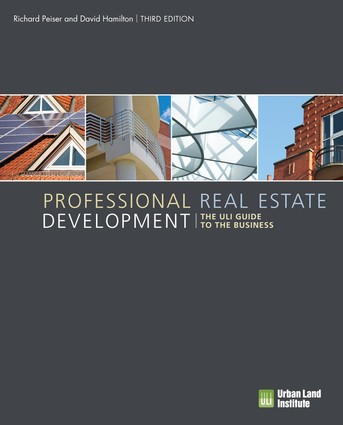Real Estate Development Process Part I Urban Land Institute
Post on: 15 Апрель, 2015 No Comment

Be able to develop, finance, and supervise a project effectively by understanding the principles and concepts of real estate development.
Real Estate Development Process: Part I
Real estate development is a complex and continually evolving business. To effectively develop, finance, or supervise a project, a person needs a fundamental understanding of the process and its many facets. To be successful, a developer must manage not only their own performance, but also the collaboration of numerous professionals representing multiple disciplines. Throughout this process, the developer also must continually identify and mitigate inherent risks that can threaten the viability of the project.
Designed for both public and private sector participants, this newly updated course follows the principal stages of the process chronologically and addresses how each team member’s actions and performance can affect the success and profitability of the project. Emphasizing the iterative and interactive nature of the real estate development process, the course combines a lecture and case study approach. Top industry professionals, drawn from ULI’s membership, serve as course leaders and guest speakers, sharing their insights, experience, and expertise with participants.
The course is broadly structured in three parts: 1) preliminary considerations, market analysis, financial analysis, and strategic marketing; 2) site selection and due diligence, land acquisition and deal structure, and entitlements and permitting; and 3) planning and design, construction management, and operations and property management. Short group exercises give students an appreciation for the interpersonal aspect of the development process. Hands-on instruction in financial analysis provides students with a fundamental understanding of pro forma modeling basics. In addition to collaboration on cases in the workshop, the program includes lunches, breaks, and a reception that give participants opportunities to network and compare notes outside the classroom environment.
Participants are expected to bring a laptop computer with Microsoft Excel in order to fully engage in the pro forma modeling and financial analysis portion of the course.
Principal Instructors
Alan Razak
AthenianRazak, LLC
Philadelphia, Pennsylvania
Alan Razak is Principal of AthenianRazak LLC, a Philadelphia-based real estate services company that consults on, creates, and manages real property. Alan has more than 35 years of commercial real estate experience, encompassing development and project management, finance, architectural design, and consulting. His diverse real estate background includes managing the development process, both as owner and on a consulting basis as owner’s representative, and project types including residential, office and commercial, as well as specialized expertise in data centers and other highly technical facilities.
Prior to merging with Athenian Properties in 2011 to form AthenianRazak, Alan founded and led Razak Company, which was responsible for the development of projects such as Main Line Jaguar Land Rover, Pembroke North Condominium, 5035 Ritter Road for the AOPC, and the Curtis Institute of Music’s Lenfest Hall. Razak Company also performed real estate consulting assignments for clients including Swarthmore College, the Rock School of Dance, Vanguard Group of Mutual Funds, and many others.
Prior to forming Razak Company in 2003, Alan was a Principal with Radnor Advisors, Inc. which was subsequently purchased by Insignia/ESG. In this role, he coordinated the marketing and service delivery to data center and high technology clients worldwide and managed the Philadelphia office’s real estate consulting group. During the early 1990s, Alan focused on international real estate and technical consulting services for government and domestic financial institutions. For much of the 1980s, he was a Partner at Rouse and Associates (now Liberty Property Trust), where he managed development of a 400,000 sf Washington, D.C. office building project and Rouse’s 20-acre Penn’s Landing urban multiuse project on Philadelphia’s waterfront
Alan began his career as an architect, and for purely sentimental reasons maintains his status as a registered architect in Pennsylvania. Alan has served on the Central Philadelphia Development Corporation’s Board of Directors, and is a member of the Urban Land Institute, where he wrote and currently teaches several workshops for real estate practitioners internationally. He holds a B.S. in Arts and Design from MIT, a Master of Architecture from the University of Washington, and an MBA with a concentration in real estate from Wharton.

Principal
Keystone Development Advisors
Naples, Florida
David H. Farmer is a developer, licensed real estate Broker, certified planner, civil engineer, state certified general contractor and Department of Environmental Protection qualified stormwater management inspector.
Dave Farmer began his career in the development industry in 1989 with an engineering firm designing commercial and residential projects for private clients. A professional engineer, Farmer left the engineering field in 2000 to work fulltime for Keystone Communities overseeing the entitlement, design and construction of residential communities, resort facilities, and commercial projects. In 2002, after earning his Certified General Contractors license, he also became responsible for the permitting and construction of custom homes.
Following a large sale of entitled and developed residential lots in 2003, the company’s focus shifted from development to entitlement and infrastructure development. At this time Farmer took on the additional responsibility of site selection and acquisition for the company. In 2005, he was made a principal of the company and participated in both the rewards and costs of acquisition, entitlement, and development.
Farmer’s development experience includes both very successful projects and less successful projects. In the tradition of ULI, he feels it’s important to focus more on mistakes made and lessons learned when teaching the real estate development process. One learns quickly what not to do when you are spending your own money on development projects.
In 2008, Farmer and his development partner dissolved the original company and each went their own way. Today he works in Florida with a new partner on identifying development sites and helping investors develop property. Farmer has brokered more than $70 million in real estate transactions and entitled thousands of homes and millions of square feet of commercial property. His favorite quote is “Begin with the end in mind.”














